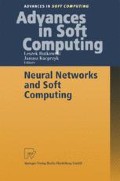Abstract
Recently we have examined properties of sup-min compositions of fuzzy implications [3]. However, in many applications, another connectives are used for composition of fuzzy implications. Now, we generalize these results to the case of sup —* composition with a triangular norm *.
Access this chapter
Tax calculation will be finalised at checkout
Purchases are for personal use only
Preview
Unable to display preview. Download preview PDF.
References
Baczynski, M., Drewniak, J. (1999): Conjugacy classes of fuzzy implication, In: Reusch, B. (Eds.): Computational Intelligence: Theory and Applications, Springer-Verlag, Berlin, (LNCS Vol. 1625), 287–298.
Baczylíski, M., Drewniak, J. (2000): Monotonic fuzzy implications, In: Szczepaniak, P., Lisboa, P., Kacprzyk, J. (Eds.): Fuzzy Systems in Medicine, PhysicaVerlag, Heidelberg, (Studies in Fuzzines and Soft Computing, Vol. 41), 90–111.
Baczynski, M., Drewniak, J., Sobera, J. (2001): Semigroups of fuzzy implications, Tatra Mt. Math. Publ. 21, 61–71.
Baldwin, J.F., Pilsworth, B.W. (1980): Axiomatic approach to implication for approximate reasoning with fuzzy logic, Fuzzy Sets Syst. 3, 193–219.
Drewniak, J., Kula, K. (2002): Generalized compositions of fuzzy relations, Presented in FSTA 2002, Liptovsky Jan, Slovakia.
Cordon, O., Herrera, F., Peregrin, A. (1997): Applicability of the fuzzy operators in the design of fuzzy logic controllers, Fuzzy Sets Syst. 86, 15–41.
Fodor, J.C., Roubens, M.C. (1994): Fuzzy Preference Modelling and Multicriteria Decision Support, Kluwer, Dordrecht.
Goguen, J.A. (1967): L-fuzzy sets, J. Math. Anal. Appl. 18, 145–174.
Klement, E.P., Mesiar, R., Pap, E. (2000): Triangular Norms, Kluwer, Dordrecht.
Schweizer, B., Sklar, A. (1961): Associative functions and statistical triangle inequalities, Publ. Math. Debrecen 8, 169–186.
Zadeh, L.A. (1965): Fuzzy sets, Inform. Control 8, 338–353.
Author information
Authors and Affiliations
Editor information
Editors and Affiliations
Rights and permissions
Copyright information
© 2003 Springer-Verlag Berlin Heidelberg
About this paper
Cite this paper
Baczyński, M., Drewniak, J., Sobera, J. (2003). On sup — * Compositions of Fuzzy Implications. In: Rutkowski, L., Kacprzyk, J. (eds) Neural Networks and Soft Computing. Advances in Soft Computing, vol 19. Physica, Heidelberg. https://doi.org/10.1007/978-3-7908-1902-1_39
Download citation
DOI: https://doi.org/10.1007/978-3-7908-1902-1_39
Publisher Name: Physica, Heidelberg
Print ISBN: 978-3-7908-0005-0
Online ISBN: 978-3-7908-1902-1
eBook Packages: Springer Book Archive

